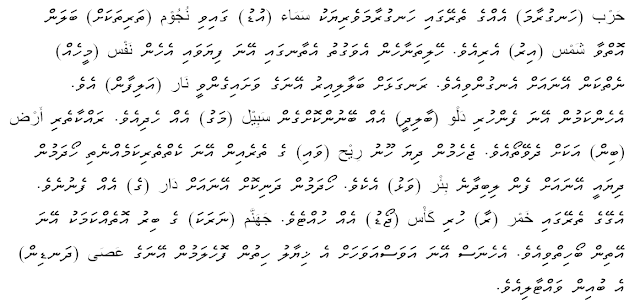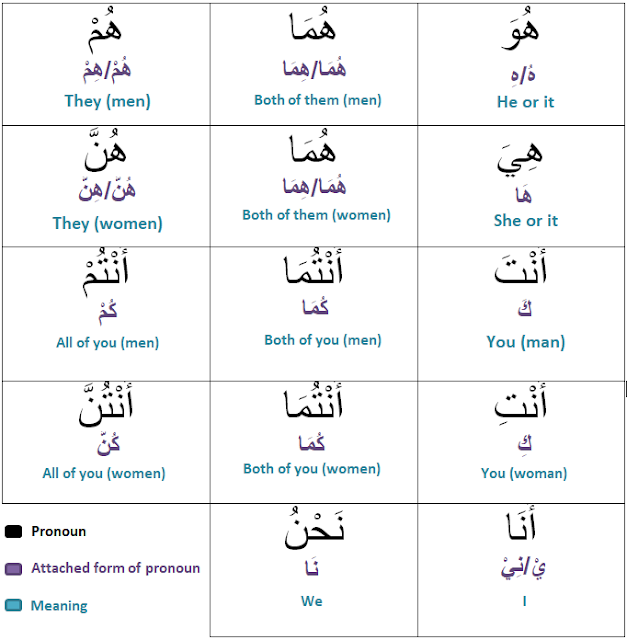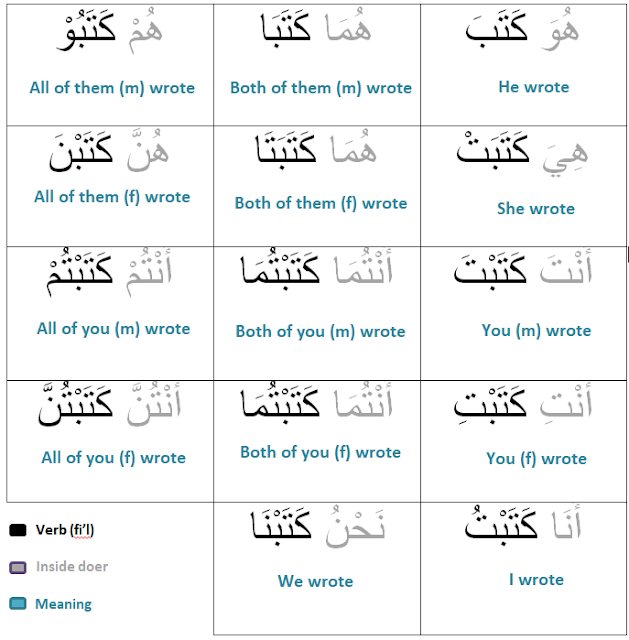Gender (detailed) English + Dhivehi
Gender (detailed)
Today we will be looking at the third property of isms,
‘gender’ in detail.
There are a few things to remember about gender.
·
Every single ism in Arabic is either masculine or
feminine.
·
There is no ‘it’ in Arabic. Everything is ‘he’ or ‘she’.
·
Generally all words in Arabic are masculine until
proven feminine.
·
To see if a word is feminine, we need to look at
certain clues.
·
This lesson will be detailing the clues to find out
what makes a word feminine.
·
To start, we have to know that there are two kinds of
feminine. They are:
1. Real feminine
2. Fake feminine
·
We will be looking at each one of these in detail in
this lesson. Bismillah!
Real Feminine
Ø ‘Real Feminine’
words are words that are talking about a female.
Ø Words like ummun
(mother), ukhthun (sister) or perhaps a name like Khadheeja are real feminine
words because those words are talking about females.
Fake Feminine
Ø ‘Fake Feminine’
words are words that are feminine but are not necessarily talking about a girl
or a female. But the Arabs use ‘she’ for these words anyway. For example the
word shams (sun) in Arabic is considered feminine.
Ø Fake feminine
words are identified using the following clues:
a)
Words ending with:
ة ى آء
ü Words that end
with the ‘round thaa’ ة are
ALWAYS feminine.
ü But when it comes to the other two
letters, a word may or may not be feminine even if it ends with those letters.
ü Let’s look at the example below:
هُدَى
ü The word ends
with ى
(alif maqsoora – short alif). But this word is only feminine if it’s talking
about a girl named Hudha. But if it’s used to mean its real meaning (guidance),
the word is masculine.
ü Similarly if a
word ends with آء (alif mamdhoodha – long
alif) it may or may not be feminine. Look at the examples below:
صَفْرَآءٌ – yellow
(masculine)
مَآءٌ – water
(feminine)
b)
Broken plurals
ü As we have seen
in the previous lesson, broken plurals are ALWAYS treated like a ‘she’ whether
human or non-human.
c)
Feminine because Arabs said so
ü There is a list
of words in Arabic that are feminine purely because the Arabs said so.
ü Below is a story
to remember some words that are feminine because Arabs said so. These are the
words in this category that appear in the Quran.
During a حَرْب
(war) a soldier was daydreaming looking at نُجُوْم
(stars) in the سَمَاء (sky) until the شَمْس
(sun) came up. When he snapped out of it he realized he is the only نَفْس
(person) left on the battlefield surrounded by نَار
(fire) so he used a دَلْو (bucket) full of water to make
a سَبِيْل (path) all the way to a safer أَرْض
(land). In the hot blowing رِيْح
(wind) he was desperately looking for a بِئْر
(well) to draw water from. In this search, he finds an empty دَار
(house) inside which he finds a كَأْس
(cup) full of خَمْر (wine). He is tempted despite
his fear of جَهَنَّم (hell) to take a sip but wards
off his temptation and uses his عَصَى
(staff) to strike the drink.
The Arabic words in this story are the words that are
feminine because the Arabs said so.
Also the body parts that are found in pair are also feminine
because the Arabs said so.
Exercise: Is it feminine?
*Please note that if there are no clues of feminine on a
word, the word will be masculine
حُجُوْر
(apartments)
أَيْمَانٌ
(promises)
مُحْصِنِيْنَ
سَيِّئاَتِ
مُعْرِضِيْنَ
رِّجَالُ
(men)
مُسَافِحِيْنَ
فَرِيْضَة
عَاقِبَةُ
قَانِتِيْنَ
الْمَلَكَيْنِ
تِجَارَة
مِئَتَيْن
طَوْلاً
الْلإِنْسَانُ
سُنَنَ
(legacies)
*These lessons are inspired by lessons of Arabic with Husna by Ustadh Nouman
********************************************************************
********************************************************************
ޖިންސް (ތަފްޞީލުކުރެވިފައި)
މިއަދު އަޅުގަނޑުމެން ތަފްޞީލުކޮށް ބަލާލާނީ އިސްމްތަކުގެ
3 ވަނަ ސިފަ ކަމަށްވާ 'ޖިންސް' އަށެވެ.
ޖިންސް އާ ބެހޭގޮތުން އަޅުގަނޑުމެން ހަނދާން
ބަހައްޓަންޖެހޭ ބައެއް ކަންތައްތަކެއްވެއެވެ.
· ޢަރަބި ކޮންމެ ބަހަކީ 'ފިރިހެން' ނޫނީ 'އަންހެން'
ބަހެކެވެ.
· ޢަރަބި ބަހުގައި 'އޭތި' އޭ
ނުކިޔާނެއެވެ. އަބަދުވެސް ކިޔާނީ އޭނަ (ފިރިހެން) ނުވަތަ އޭނަ (އަންހެން) އެވެ.
އެއީ ތަކެއްޗަށް ވިޔަސްމެއެވެ.
· ޢާއްމުގޮތެއްގައި ހުރިހާ ޢަރަބި ބަހަކީ
ވެސް ފިރިހެން ބަސްތަކެވެ. އެ ބަސް އަންހެން ބަހަކަށް ހަދާ ސަބަބެއްނެތްނަމައެވެ.
· މި ފިލާވަޅުގައި އަޅުގަނޑުމެން
ބަލާލާނީ ބަހެއް އަންހެން ކުރުވާ ސަބަބުތަކަށެވެ.
· ފެށުމަށްޓަކައި ދެ ވައްތަރެއްގެ
އަންހެން ބަސްތަކެއް ވާކަން އަޅުގަނޑުމެންނަށް އެނގެން ޖެހެއެވެ. އެއީ:
1.
އަޞްލު އަންހެން
2.
އަޞްލުނޫން އަންހެން
· މި ފިލާވަޅުގައި މި ދެބަޔަށް
ތަފްޞީލުކޮށް ބަލާލަމާ ހިނގާށެވެ. ބިސްމި ﷲ!
އަޞްލު އަންހެން
ü އަޞްލު އަންހެން ބަސްތަކަކީ
އަންހެނުންނަށް ނިސްބަތްވާ ބަސްތަކެވެ. މިސާލަކަށް އުއްމުން (މަންމަ)، އުޚްތުން
(ދައްތަ) ނުވަތަ ޚަދީޖާ ކަހަލަ އަންހެނަކަށް ނިސްބަތްވާ ނަމެކެވެ.
ü މި ބަސްތައް އަންހެން ވަނީ މި ބަސްތައް
އަންހެނަކަށް ނިސްބަތްވާތީވެއެވެ.
އަޞްލުނޫން އަންހެން
ü އަޞްލުނޫން އަންހެން ބަސްތަކަކީ
އަންހެނަކަށް ނިސްބަތްނުވިޔަސް އަންހެނެއް ފަދައިން އެއާއިމެދު ވާހަކަ ދެކެވޭ
ބަސްތަކެވެ. މިސާލަކަށް 'ޝަމްސް' (އިރު) އަކީ ޢަރަބި ބަހުގައި އަޞްލުނޫން އަންހެން
ބަހެކެވެ.
ü އަޞްލުނޫން އަންހެން ބަސްތައް
ތިރީގައިމިވާ ކަންތަކުން ދެނެގަނެވޭނެއެވެ.
ހ) ތިރީގައިމިވާ އަކުރުތަކުން
ނިމޭ ބަސްތައް
ة ى آء
ü ވަށްކޮށް އޮންނަ 'ތާ' ة އިން ނިމޭ ހުރިހާ ބަސްތަކަކީ
އަންހެން ބަސްކެކެވެ.
ü އެހެނަސް
ދެން އޮތް ދެއަކުރުން ނިމޭ ބަސްތަކުގެ ތެރެއިން އަންހެން ވަނީ ބައެއް ބަސްތަކެވެ.
ü ތިރީގައި މިވާ މިސާލަށް ބައްލަވާށެވެ.
هُدَى
ü މި ބަސް ނިމެނީ ى (އަލިފް
މަޤްޞޫރާ) އިންނެވެ. އެހެނަސް މި ބަސް އަންހެން ވާނީ ހުދާ ނަމަކަށް ކިޔާ އަންހެން
ކުއްޖަކާ ބެހޭގޮތުން ވާހަކަ ދެކެވޭއިރު އެކަންޏެވެ. އޭގެ އަސްލު މާނަ ކަމުގައިވާ
ހިދާޔަތުގެ މާނައިގައި ބޭނުން ކުރެވޭއިރު އެއީ ފިރިހެން ބަހެކެވެ.
ü ހަމަ މިފަދައިން آء (އަލިފް މަމްދޫދާ) އިން ނިމޭ
ބަސްތަކުގެ ތެރެއިން އަންހެން ވާނީ ބައެއް ބަސްތަކެވެ. ތިރީގައިވާ މިސާލުތަކަށް
ބައްލަވާށެވެ.
صَفْرَآءٌ – ރީނދޫ
(އަންހެން)
مَآءٌ – ފެން
(ފިރިހެން)
ށ) ޖަމްޢުއްތަކްސީރު (ބިނދިފައިވާ
ޖަމްޢުތައް)
ü ކުރީގެ ފިލާވަޅުން އަޅުގަނޑުމެންނަށް
ފެނުނު ފަދައިން ހުރިހާ ޖަމްޢުއްތަކްސީރުގެ ބަސްތަކަށް ނިސްބަތްކުރެވޭނީ އަންހެން
ކުއްޖަކާމެދު ވާހަކަ ދައްކާ ފަދައިންނެވެ.
ނ) ޢަރަބިން ބުނީތީ އަންހެންވީ
ބަސްތައް
ü ޢަރަބި ބަހުގެ ބައެއް ބަސްތަކަކީ
ހަމައެކަނި ޢަރަބިން ބުނީތީ އަންހެން ވެފައިވާ ބަސްތަކެވެ.
ü ތިރީގައި މި ވަނީ އޭގެ ތެރެއިން ބައެއް
ބަސްތައް ހަނދާނުގައި ބަހައްޓަން ފަސޭހަކުރުމުގެ ގޮތުން އެ ބަސްތަކާއެކީ
ލިޔެވިފައިވާ ވާހަކައެކެވެ. މި ބަސްތަކަކީ ޢަރަބިން ބުނީތީ އަންހެންވީ ބަސްތަކުގެ
ތެރެއިން ޤުރުއާނުގައި ހުންނަ ބަސްތަކެވެ.
މި ވާހަކައިގައިވާ ޢަރަބި
ބަސްތަކަކީ ޢަރަބިން ބުނީތީ އަންހެންވާ ބަސްތަކެވެ.
މީގެ އިތުރުން ވެސް
ހަށިގަނޑުގައިވާ ގުނަވަންތަކުގެ ތެރެއިން ޖޯޑެއްގެ ގޮތުގައި ހުންނަ ގުނަވަންތަކަށް
ކިޔާ ނަންތަކަކީ ވެސް ޢަރަބިން ބުނީތީ އަންހެން ބަސްތަކެވެ.
ފަރިތަކުރުން: މިއީ އަންހެން
ބަހެއްތަ؟
ނޯޓް: ބަހެއް އަންހެން ވުމަށް
މެދުވެރިވާ އެއްވެސް ސަބަބެއްނެތްނަމަ އެ ބަސްވާނީ ފިރިހެން ބަހަކަށެވެ.
حُجُوْر
(ކޮޓަރިތައް)
أَيْمَانٌ (ވަޢުދުތައް)
مُحْصِنِيْنَ
سَيِّئاَتِ
مُعْرِضِيْنَ
رِّجَالُ (ފިރިހެނުން)
مُسَافِحِيْنَ
فَرِيْضَة
عَاقِبَةُ
قَانِتِيْنَ
الْمَلَكَيْنِ
تِجَارَة
مِئَتَيْن
طَوْلاً
الْلإِنْسَانُ
سُنَنَ (ސުންނަތްތައް)



Comments
Post a Comment